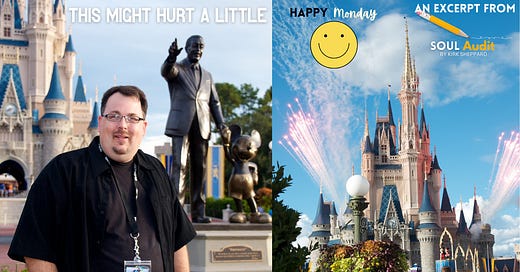Happy Monday! Today, I thought I’d share with you an excerpt from my book, Soul Audit: A Not-So-Perfect, Broadly Spiritual (Or Not) Guide to Living in Alignment. It’s available now wherever books are sold including Amazon.
(You can get an autographed copy from me at kirksheppard.com.)
I once spent my birthday alone at Disney World.
That might sound depressing, but honestly, it wasn’t. I love solo trips. I can do what I want, when I want, with no obligation to anyone else. I don’t have to wait for someone else to be ready. I don’t have to negotiate ride preferences or dining plans. I just go. It’s peaceful. It’s freeing. (I value independence, remember.)
Earlier that morning, the cast member at my hotel had asked if I was celebrating anything special during my stay. When I said it was my birthday, she handed me a little round button and encouraged me to wear it proudly. I hesitated. I wasn’t sure I wanted that kind of attention. But I pinned it on anyway.
And something unexpected happened.
All day long—on the bus, in the parks, standing in line, walking through shops—people wished me a happy birthday. Ride operators. Custodians. Other guests. “Happy birthday, Kirk!” they’d say, and smile. Just that. Simple acknowledgment. Just kindness.
It was lovely.
And it caught me off guard how much I liked it.
I’d thought the button would make me feel exposed. What it actually made me feel was seen.
I’d made a dinner reservation that evening at the Plaza Inn, right at the end of Main Street—the perfect place to wrap up the day. When I booked it online, there’d been a little box asking if I was celebrating anything. I’d checked “Birthday,” thinking maybe I’d get a free dessert or a little extra sprinkle of Disney magic. Nothing major.
Dinner went smoothly. I sat at my table alone, enjoying the atmosphere, watching families pass by with mouse ears and matching shirts. I felt content. Independent. Grown-up.
And then the server came out of the kitchen holding a cupcake with a lit candle in it.
He walked into the dining room like a showman and announced, “Ladies and gentlemen, there’s someone very special with us today!”
I looked around the restaurant, curious who the VIP might be.
And then he kept going.
“The only problem is,” he said, “he’s celebrating his birthday all alone. So we need to sing Happy Birthday to him to make him feel better.”
My stomach dropped. My face flushed. There was no question who he was talking about.
The entire restaurant turned to look at me.
I wanted to disappear under the table. But I didn’t. I smiled, kind of. I endured the song. And yes—I ate the free cupcake. But the whole thing left me feeling humiliated. Not because I was alone, but because someone had framed my aloneness as a problem to be fixed. He didn’t mean harm. I know that. But instead of celebrating me, it felt like I was being pitied. Like I was being put on display.
I had come to Disney alone on purpose. But now I was alone in a spotlight, and it felt awful.
And here’s the thing: both moments—the birthday button and the restaurant scene—involved attention. But only one felt good.
That’s the difference between vulnerability and violation. One is invited; the other not so much.
And if you’ve been put on display too many times, you might start avoiding all vulnerability—even the kind that could help you heal.






